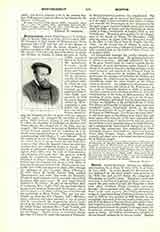
Alexis-Francois Artaud de Montor
Diplomat and historian, b. at Paris, July 31, 1772; d. at Paris, Nov. 12, 1849

Montor , ALEXIS-FRANCOIS ARTAUD DE, diplomat and historian, b. at Paris, July 31, 1772; d. at Paris, November 12, 1849. An emigre during the Revolution, he was entrusted by the royal princes with missions to the Holy See and served during the campaign of Champagne in Conde’s army. Bonaparte made him secretary of the French Legation at Rome; Artaud occupied this post under Cacault, left Rome for a short time when Cardinal Fesch, Cacault’s successor, brought Chateaubriand with him, and returned to Rome in the same capacity after Chateaubriand had resigned. Appointed charge d’affaires of France to Florence in 1805 he was recalled in 1807 because he was wrongfully suspected of having employed his power in behalf of the Queen of Etruria whose possessions Napoleon wished to give to Elisa Bonaparte. Made censor during the last years of the empire, he became under the Restoration secretary of the embassy at Vienna, then again at Rome. In 1830 he retired upon a pension to devote himself exclusively to literary works. Besides his translation of Dante’s “Divina Commedia” (1811-1813) which was rated very highly, Artaud de Montor left important historical works: “Machiavel, son genie et ses erreurs” (Paris, 1833); the volume on the history of Italy in the collection of the “Univers pittoresque” (Paris, 1834); “Histoire du pape Pie VII” (2 vols., Paris, 1836); “Histoire de Dante Alighieri” (Paris, 1841); “Histoire des souverains pontifes romains” (8 vols., Paris, 1842); “Histoire de Ikon XII” (Paris, 1843); “Histoire de Pie VIII” (Paris, 1843). Shortly before his death, he published in 1849 when Pius IX was banished to Gaeta, a work entitled: “La papaute et les emeutes romaines”. His recollections and his observations as a diplomat form the valuable feature of Artaud de Montor’s historical works. He was a member of the Academie des Inscriptions et belles lettres from December 17, 1830.
GEORGES GOYAU

